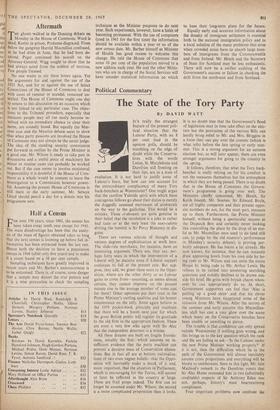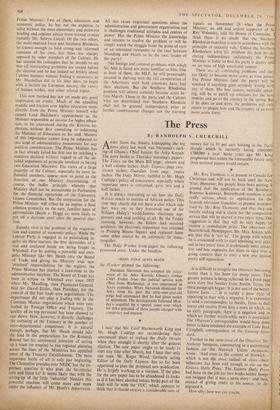Political Commentary
The State of the Tory Party
By DAVID WATT IT'S really the strangest feature of the present poli- tical situation that the Labour Party, with an 8 per cent lead in the opinion polls, should be trembling on the edge of doubt while the Conserva- tives with the words Luton, St. Marylebone and Dumfries still freezing on their lips, are in a state of exaltation. It is not hard to justify some of Labour's fears, but how can one account for the extraordinary complacency of many Tory back-benchers at Westminster? One might argue that the carefree Yuletide spirit with which these courageous fellows go about their duties is merely the doggedly assumed merriment of aristocrats on the way to the guillotine. This would be a mistake. These ci-devants are quite genuine in their belief that the revolution is a joke in rather bad taste or at the very least the sans-culotte driving the tumbril is Sir Percy Blakeney in dis- guise.
There are various schools of thought and various degrees of sophistication at work here. The slide-rule merchants, for instance, have an interesting argument. There are, they say, per- haps forty seats in which the intervention of a Liberal will bedecisive even if Liberal support continues to fall at the present rate. But sup- pose, they add, we grant these seats to the Oppo- sition, where are the other thirty or so Labour gains to come from—assuming, as seems almost certain, they cannot improve on the present minute rise in the average number of votes cast for them? Other optimists put their trust in the Prime Minister's sterling qualities and his honest countenance on the telly. Some again believe in the 1959 pocket-book principle and maintain that there will be a boom next year for which the great British public will register its gratitude to the old firm in the appropriate fashion. There are even a very few who agree with Sir Alec that the independent deterrent is a winner.
All these dreams are built on fragile founda- tions, notably the first—which assumes on in- sufficient evidence that the party machine can prevent a decisive mass of Conservative absten- tions. But in fact all are at bottom rationalisa- tions of two even vaguer beliefs—that the Oppo- sition will inevitably make a muck of it and, more important, that the situation in PaHiament, which is encouraging for the Tories, will sooner or later be reflected in the country at large. These are frail props indeed. The first can no longer be assumed under Mr. Wilson; the second is a more complicated proposition than it looks. It is no doubt true that the Government's flood of legislation may in time take effect on the elec- tors but the provisions of the various Bills can hardly bring relief to Mr. and Mrs. Bloggins in a form they can pay over the counter (which is what tells) before the late spring or early sum- mer. This is a strong argument for an autumn election but, as will later appear, there are even stronger arguments for going to the country in the spring.
It follows, therefore, that what the Tory back- bencher is really relying on for his comfort is not the measures themselves but the atmosphere in which they are being passed. There is no doubt that in the House of Commons the Govern- ment's programme is going over well. The Ministers chiefly concerned, Mr. Heath, Sir Keith Joseph, Mr. Soames, Sir Edward Boyle, are all highly competent and their present oppo- site numbers do not, for the most part, measure up to them. Furthermore, the Prime Minister himself, without being a spectacular success at the Dispatch Box and certainly never looking like controlling the place by the drop of an eye- lid as Mr. Macmillan once used to do (and still• can, to judge by the old maestro's performance in .14onday's security debate), is proving per- fectly adequate. He has learnt a lot already. He now knows, for instance, that he can instantly draw approving howls from his own side by be- ing rude to Mr. Wilson and can unite the entire House by being rude to Mr. Arthur Lewis. He refuses to be rattled into answering searching questions and stolidly declines to be drawn out- side his brief. He grins with boyish charm when- ever he can appropriately do so. In short, Government supporters can feel that 'Alec is putting up a good show' and that his clever young Ministers have recaptured some of the initiative from Mr. Wilson. After the terrors of the summer and early autumn this Macmillan- less idyll has cast a rosy glow over the scene which many on the Conservative benches have been unable or unwilling to pierce.
The trouble is that confidence can only spread outside Westminster, if nothing goes wrong, and this brings us to the key question which the rank and file are failing to ask—'Is the Cabinet under the new Prime Minister working properly?' If it is not, then the difficulties which lie in the path of the Government will almost inevitably .assume crisis proportions and everything will be blown to smithereens. Seen in this light, Mr. lain Macleod's remark to the Dumfries voters that Sir Alec Home reminded him in two (admittedly creditable) respects of Sir Anthony Eden was not, perhaps, history's most heartwarming compliment.
Four important problems now confront the
Prime Minister. Two of them, education and economic policy, he has not the expertise to solve without the most elementary and extensive briefing and copious advice from trusted cronies (notably Mr. Selwyn Lloyd). Of the two others, the multi-manned force and Southern Rhodesia, he knows enough to hold strong and informed opinions of his own, but these arc sharply opposed by other members of the Cabinet. He has assured his colleagues that he intends to see that all outstanding problems are settled before the election and he has indeed set briskly about Cabinet business without finding it necessary, as Mr. Macmillan did in his later days, to begin with a lecture on European history, the Nanny of human wishes, and other related topics.
This new method has not yet made any great impression on events. Much of the appalling muddle and friction over higher education stems directly from the Prime Minister himself who caused Lord Hailsham's appointment as the Minister responsible ad interim for higher educa- tion, to be announced during the Kinross by- election without first consulting or informing the Minister of Education or his staff. Matters of this importance cannot long be subjected to this kind of administrative monstrosity for any political consideration. The Prime Minister has in fact already failed his first test by, reaching a tentative decision without regard to all the de- tailed arguments of principle involved in having two Education Ministers. The views of a large majority of the Cabinet, especially its most in- fluential members, appear now to point in the direction of one Ministry (maintaining, of course, the buffer principle whereby that Ministry shall not be accountable to Parlianient for the financial operations of the University Grants Committee). But the temptation for the Prime Minister will either be to impose a final solution primarily on the easy, familiar basis of personalities (Boyle v. Hogg) or, more likely to put off a decision until after the general elec- tion.
Equally vital is the problem of the organisa- tion and control of economic policy. While the Labour Party is engaged in its painstaking in- quiry on these matters, the first skirmishes of a real and confused battle are being fought in Whitehall. For by putting a powerful and ener- getic Minister like Mr. Heath into the Board of Trade and giving his Ministry wide new 'overlord' responsibilities for the regions, the Prime Minister has planted a land-mine in the administrative machine. The Board of Trade has been in eclipse in Whitehall ever since 1957 when Mr. Maudling, then Paymaster-General, beat Sir David Eccles, then President, for the control of the free trade area negotiations. The department did not play a leading role in the Common Market negotiations which were con- trolled by Foreign Office, and Treasury. The quality of its top personnel has been allowed to run down. Now, however, it directly challenges the authority of the Treasury in the number of inter-departmental committees. It is natural enough, perhaps, that Mr. Heath should take the lead in the preparations for the Kennedy Round but his announced intention of setting up a team (or empire) to run regional planning across the lines of the Ministries has appalled some of the Treasury Establishment. The most important battle of all is only just beginning. The Chancellor presides over NEDC but the im- portant question is who does the Secretariat turn and listen to? It seems likely that with the setting-up of the little 'industrial' Neddies this powerful machine will come more and more under the influence of Mr. Heath's department.
All this raises important questions about the administration and government organisation and it challenges traditional attitudes and centres of power. Has the Prime Minister the knowledge and interest to resolve the problem or will he simply watch the struggle from the point of view of an interested bystander to the race between Maudling and Heath to be the next leader of the party?
The foreign and colonial problems with whigh Sir, Alec is faced are more familiar to him. One at least of them, the MLF, he will presumably succeed in shelving with the full co-operation of the Americans until both countries have had their elections. But the Southern Rhodesian problem will almost certainly become acute be- fore /March. Those in the party and the Cabinet who are determined that Southern Rhodesia shall not be granted independence prior to further constitutional changes saw the warning signals on November 28 when the Prime Minister, an old and ardent supporter of Sit Roy Welensky, told the House of Commons, 1 think there is no doubt that the Southern Rhodesian franchise is one in accordance with th principle of majority rule.' Unless the Southern. Rhodesians solve his problem for him by (lei Glaring independence unilaterally the Primil Minister is liable to find his party is deeply split on an issue of high emotional content.
These are all continuing problems and they are likely to become more acute as time passes. The Prime Minister (and the party) will he wrecked if anything goes seriously wrong v' ith any of them. His best course, tactically speak- ing, will be to patch up solutions for the nest months and go to the country in the spring. But if he does so and wins, the problems will only return to plague him and the countr> in an t.■ cn more acute form.































 Previous page
Previous page